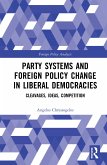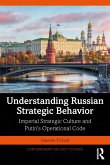In this book, senior scholars and a new generation of analysts present different applications of recent advances linking beliefs and decision-making, in the area of foreign policy analysis with strategic interactions in world politics.
Divided into five parts, Part 1 identifies how the beliefs in the cognitive operational codes of individual leaders explain the political decisions of states. In Part 2, five chapters illustrate progress in comparing the operational codes of individual leaders, including Vladimir Putin of Russia, three US presidents, Bolivian president Evo Morales, Sri Lanka's President Chandrika Kumaratunga, and various leaders of terrorist organizations operating in the Middle East and North Africa. Part 3 introduces a new Psychological Characteristics of Leaders (PsyCL) data set containing the operational codes of US presidents from the early 1800s to the present. In Part 4, the focus is on strategic interactions among dyads and evolutionary patterns among states in different regional and world systems. Part 5 revisits whether the contents of the preceding chapters support the claims about the links between beliefs and foreign policy roles in world politics.
Richly illustrated and with comprehensive analysis Operational Code Analysis and Foreign Policy Roles will be of interest to specialists in foreign policy analysis, international relations theorists, graduate students, and national security analysts in the policy-making and intelligence communities.
Divided into five parts, Part 1 identifies how the beliefs in the cognitive operational codes of individual leaders explain the political decisions of states. In Part 2, five chapters illustrate progress in comparing the operational codes of individual leaders, including Vladimir Putin of Russia, three US presidents, Bolivian president Evo Morales, Sri Lanka's President Chandrika Kumaratunga, and various leaders of terrorist organizations operating in the Middle East and North Africa. Part 3 introduces a new Psychological Characteristics of Leaders (PsyCL) data set containing the operational codes of US presidents from the early 1800s to the present. In Part 4, the focus is on strategic interactions among dyads and evolutionary patterns among states in different regional and world systems. Part 5 revisits whether the contents of the preceding chapters support the claims about the links between beliefs and foreign policy roles in world politics.
Richly illustrated and with comprehensive analysis Operational Code Analysis and Foreign Policy Roles will be of interest to specialists in foreign policy analysis, international relations theorists, graduate students, and national security analysts in the policy-making and intelligence communities.
"This is an indispensable volume to advance the study of political leaders and foreign policy. The chapters individually and collectively push theoretical, methodological, and empirical boundaries to showcase state-of-the-art work on operational codes. I am extremely impressed by the book's rigor, its comparative perspective, and its relevance to significant foreign policy issues. I highly recommend 'crossing Simon's bridge' with this volume that is chock-full of excellent research."
Juliet Kaarbo, University of Edinburgh
"Occasionally, there is a "big picture" book that brings together disparate strands of scholarship into a coherent whole that is much greater than the sum of its parts. This is one of those books. Built on decades of data gathering, methodological innovation and theoretical development, Walker, Schafer, and their colleagues skillfully illuminate the complex linkages among leader personality, belief systems, and foreign policy roles. This is a pathbreaking synthesis and a vital contribution to the field of foreign policy analysis."
Paul Kowert, University of Massachusetts Boston
"This excellent volume has taken a huge step toward bridging the study of minds and international relations, showing with great clarity and rigor how leaders' characteristics shape and shove foreign policies and strategic interactions. It represents a watershed moment in the study of agency in international relations, bringing together sophisticated methods and innovative theorising to clarify the role leaders play on the world stage."
Ryan K Beasley, University of St. Andrews
"This major work of scholarship brings together an outstanding team to make advancements in application of operational code analysis to a wide range of leaders around the globe. Comparative case studies, statistical analysis of conflict processes involving the US in particular, and computational game-theoretic models of decision-making are brought together to produce impressive new findings. The theory and findings from this volume will be of great interest to many readers, notably specialists in foreign policy analysis and the policy-making community."
Patrick James, Dornsife Dean's Professor of International Relations, University of Southern California
"Walker, Schafer, and their contributors clear a new theoretical and empirical path between the study of foreign policy and international relations. The authors develop and fully explicate the means to bring behavioral science-through Operational Code-and social science-through Role Theory-together so that we understand the micro-foundations of IR and the meso-effects of the structure on decision-making units. This volume is a must read for students of foreign policy and international relations alike, for to understand our changing world, we must consider both decision-makers and the environments they create."
Cooper Drury, University of Missouri
Juliet Kaarbo, University of Edinburgh
"Occasionally, there is a "big picture" book that brings together disparate strands of scholarship into a coherent whole that is much greater than the sum of its parts. This is one of those books. Built on decades of data gathering, methodological innovation and theoretical development, Walker, Schafer, and their colleagues skillfully illuminate the complex linkages among leader personality, belief systems, and foreign policy roles. This is a pathbreaking synthesis and a vital contribution to the field of foreign policy analysis."
Paul Kowert, University of Massachusetts Boston
"This excellent volume has taken a huge step toward bridging the study of minds and international relations, showing with great clarity and rigor how leaders' characteristics shape and shove foreign policies and strategic interactions. It represents a watershed moment in the study of agency in international relations, bringing together sophisticated methods and innovative theorising to clarify the role leaders play on the world stage."
Ryan K Beasley, University of St. Andrews
"This major work of scholarship brings together an outstanding team to make advancements in application of operational code analysis to a wide range of leaders around the globe. Comparative case studies, statistical analysis of conflict processes involving the US in particular, and computational game-theoretic models of decision-making are brought together to produce impressive new findings. The theory and findings from this volume will be of great interest to many readers, notably specialists in foreign policy analysis and the policy-making community."
Patrick James, Dornsife Dean's Professor of International Relations, University of Southern California
"Walker, Schafer, and their contributors clear a new theoretical and empirical path between the study of foreign policy and international relations. The authors develop and fully explicate the means to bring behavioral science-through Operational Code-and social science-through Role Theory-together so that we understand the micro-foundations of IR and the meso-effects of the structure on decision-making units. This volume is a must read for students of foreign policy and international relations alike, for to understand our changing world, we must consider both decision-makers and the environments they create."
Cooper Drury, University of Missouri









